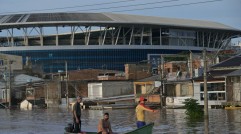Roseland Ballroom Closing: NYC Music Venue Where Tito Puente Once Played, Says Adios with Lady Gaga as Its Last Gig
New York City's iconic music venue, the Roseland Ballroom, which has existed for almost a century, is closing its doors on Monday, April 7 with the last performance by the eccentric, vocal powerhouse, Lady Gaga, who will live stream the event. The music venue has welcomed many legendary artists throughout the years, including Spanish Harlem's Tito Puente, who has been hailed as "the Godfather of Latin jazz and salsa."
Puente, who was of Puerto Rican decent, devoted more than six decades of his life to performing Latin music and earning a reputation as a masterful percussionist. "Noted for merging Latin American rhythms with contemporary jazz and big band music, Puente's prolific output encompasses over 100 albums recorded between 1949 and 1994."
Born in New York City's Spanish Harlem on April 20, 1923, Puente was surrounded by talented musicians like himself, where "the hybrid of Afro-Cuban and Afro-Puerto Rican music helped create salsa music."
In 1948, Puente formed his own band, The Piccadilly Boys. Puente, Perez Prado and Tito Rodriguez became the stars of the New York Palladium, and helped popularize the new Cuban music called the mambo.
In 1956, he was named the "King of Latin Music" by virtue of a popular poll and 1958 saw the release of his best seller Dance Mania.
In the 1960s, Puente was drawn to jazz. He began playing in New York jazz clubs, trying to fuse jazz and the Latin beat he helped popularize.
In 1970, Carlos Santana recorded an old Puente hit "Oye, Como Va," and it skyrocketed into the Top 40, while in 1977 Santana and Puente performed together in a memorable Manhattan concert "that sent the audience into screaming fits of adoration."
He also established the Tito Puente Scholarship fund to help young artists work in music.
Sadly, Puente collapsed after a concert in Puerto Rico and died after open-heart surgery in May 2000.
Roseland Ballroom's History
The landmark Roseland Ballroom first opened in 1917 in Philadelphia and two years later, it opened in New York City on Broadway and 51st Street. That original location closed in 1956 and re-opened on West 52nd Street. (Lady Gaga's performance will conclude Roseland's nearly 58-year run at 239 West 52nd St.)
Besides Puente, Roseland has welcomed numerous artists from all different genres -- from Fiona Apple, Madonna, the Rolling Stones to Metallica, and even Hillary Clinton. Also in the past, Roseland welcomed musical pioneers, Bill (Bojangles) Robinson, Betty Grable, James Cagney and Louis Armstrong, among many others.
According to The New York Times, "its history extends through multiple eras and attitudes: segregation and multiracial jazz lineups, historic big bands and 'taxi dancers' for hire, grueling Depression-era dance marathons and glittery disco nights, a ban on the twist and, decades later, more than one mosh pit.
"In recent decades it presented both nostalgic music for dancers and -- although its acoustics and sightlines were never ideal - current rock and pop concerts, including shows by superstars scaling down for special occasions: Madonna, Beyoncé, the Rolling Stones. Yet taken as a whole, through the years, what happened on Roseland's dance floor may have been as significant as anything onstage."
The New York Times adds that one of theses memorable moments was in 1974 when Harry James, Sy Oliver and Puente stage a "big-band ball" at Roseland on July 1, as part of the Newport Jazz Festival, which delighted the owner.
"Cheek-to-cheek dancing, that's what this place is all about," Brecker told The Times. "When the twist came out, my children warned me I was crazy not to allow it. Well, I didn't, and I'm still here, and the business is just fine. A lot of those twist places aren't around anymore; one, I think, is a massage parlor."
Sadly, it turns out the business is no longer "just fine" and will close it's doors, leaving many fans pondering its departure and wondering what could have been.
Subscribe to Latin Post!
Sign up for our free newsletter for the Latest coverage!














